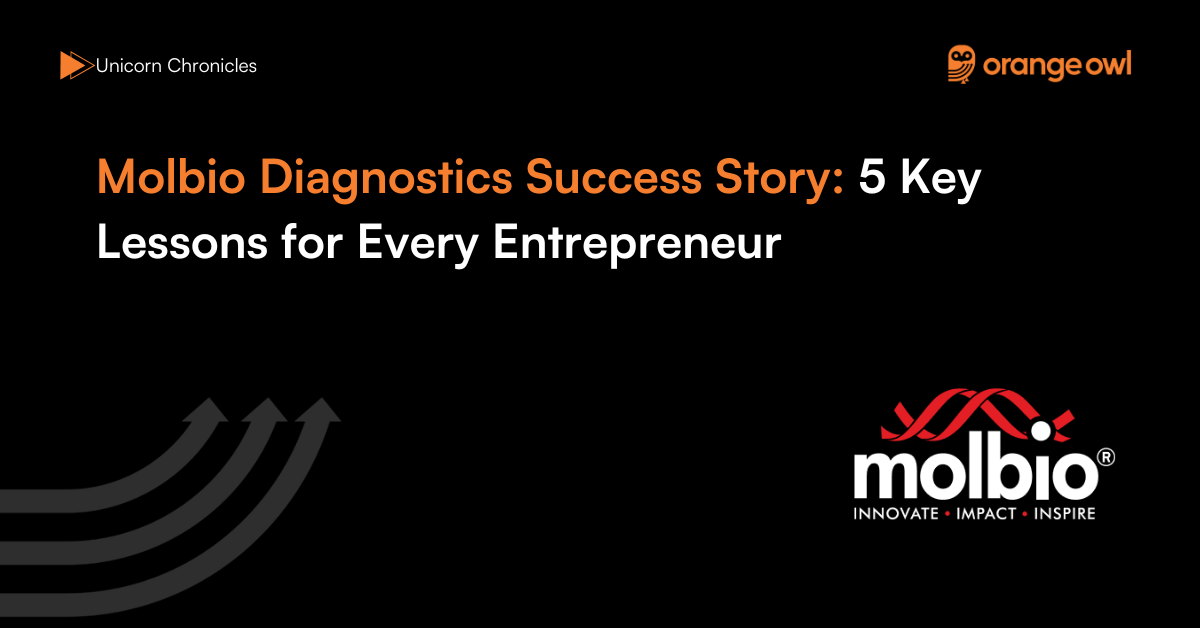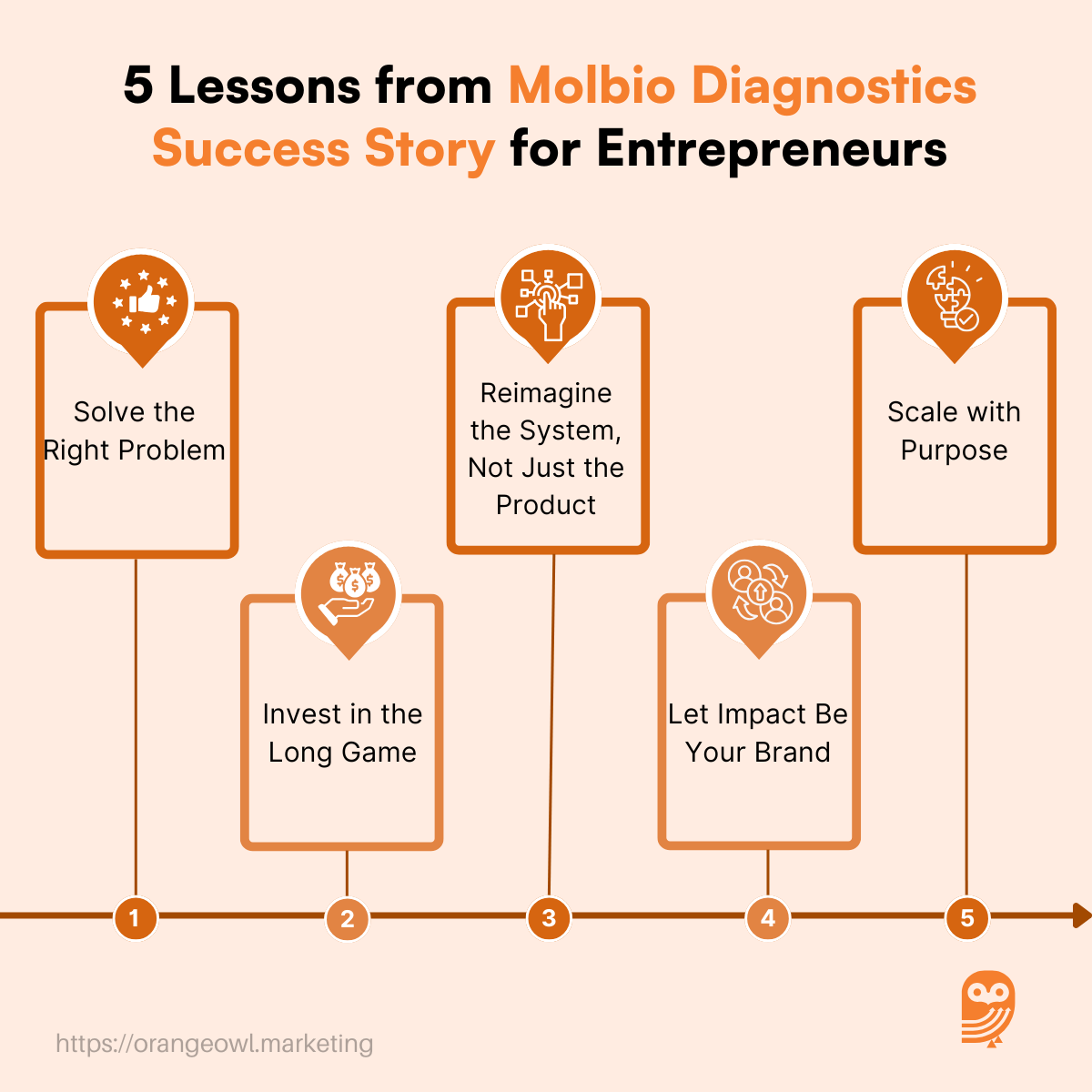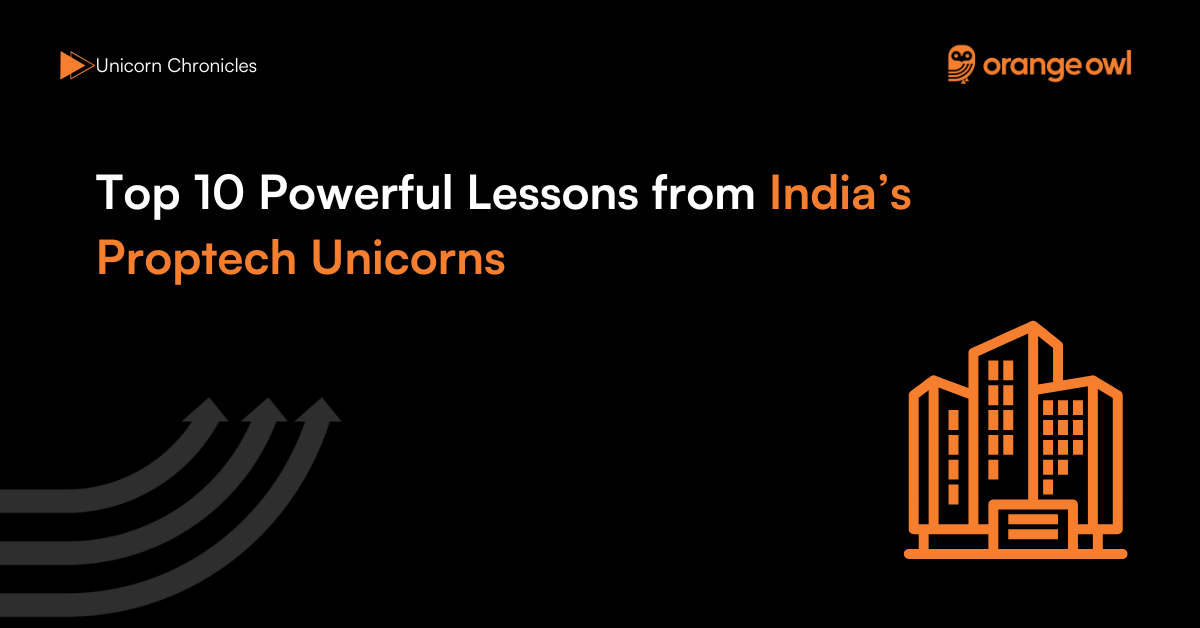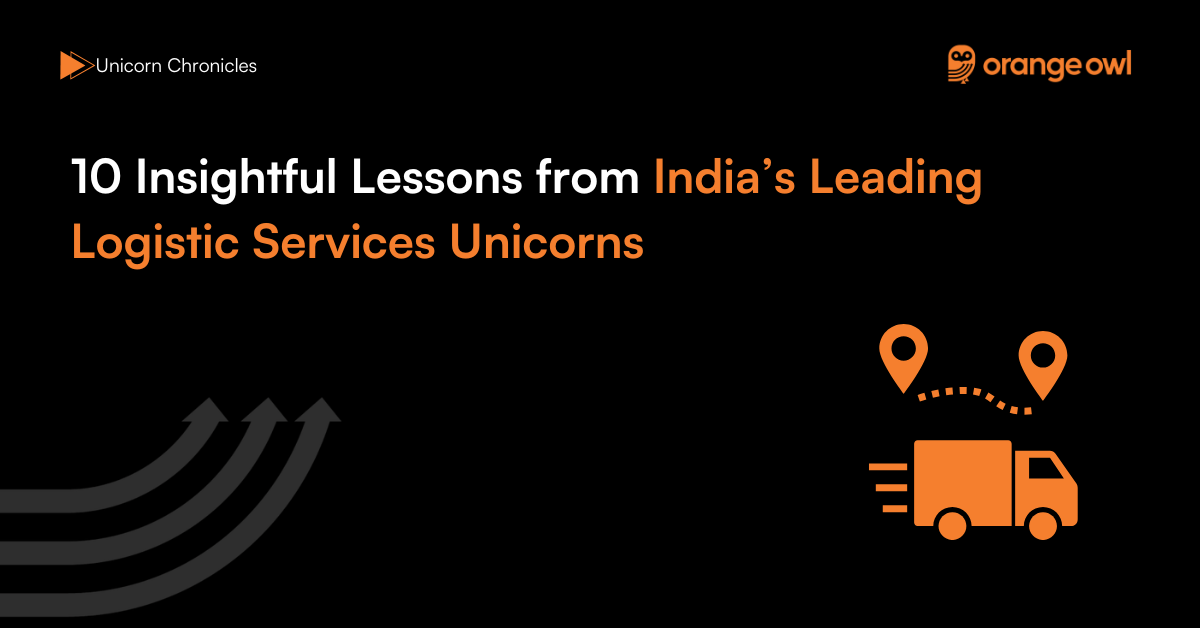Molbio Diagnostics Success Story: 5 Key Lessons for Every Entrepreneur
Vivek Goel
June 7, 2025

Table of Contents
Introduction
Molbio Diagnostics is a remarkable example of innovation meeting impact. Co-founded by Sriram Natarajan and Chandrasekhar Nair, this Goa-based medtech company has revolutionized molecular diagnostics with its flagship innovation—Truenat, a portable, battery-operated RT-PCR platform. Unlike traditional RT-PCR machines that require centralized labs, Truenat enables real-time testing at the point of care, even in the most remote and underserved areas.
The impact of this innovation is profound. As of 2024, Truenat is used in over 5,000 testing centers across India, and has been deployed in over 25 countries.
It is endorsed by global health agencies like WHO, ICMR, and FIND, and has been integrated into India’s National TB Elimination Program (NTEP). Truenat has screened over 50 million patients to date for critical diseases such as tuberculosis, COVID-19, HIV, hepatitis, and dengue.
During the COVID-19 pandemic, Molbio’s Truenat became one of the first platforms approved by ICMR for decentralized RT-PCR testing—providing rapid and reliable results in under 60 minutes. This drastically reduced testing bottlenecks, especially in tier-2 and rural regions where lab infrastructure was scarce.
“We didn’t want to create just another diagnostics device—we wanted to reimagine where and how diagnostics could happen.” — Sriram Natarajan, Founder & CEO, Molbio Diagnostics
Molbio is more than a diagnostics company—it is a movement toward accessible, equitable, and life-saving healthcare diagnostics, made in India, for the world.
Origin Story
The idea behind Molbio didn’t begin with a product—it began with a problem. In the early 2000s, Sriram Natarajan observed a glaring healthcare gap: millions of people in rural and underserved regions had little to no access to timely diagnostic testing.
Diseases like tuberculosis, malaria, and HIV often went undetected or were diagnosed too late—purely because lab infrastructure was located in urban hubs.
The turning point came when Sriram realized that diagnostics shouldn’t be confined to the lab—they should go to where the patient is. This insight became the bedrock for what would later evolve into Truenat, a robust, portable, battery-operated RT-PCR platform capable of delivering high-quality molecular diagnostics outside of traditional settings.
However, innovation of this scale takes time. Over 12 years of relentless R&D, Molbio—through its research arm Bigtec Labs—worked on building a platform that was not only accurate but also field-deployable. The journey included numerous clinical validations, pilot programs, and partnerships with institutions like ICMR and CSIR to build credibility and scientific rigor.
“We knew it would be a long and lonely road, but the problem we were solving was too important to ignore.” — Sriram Natarajan, Founder & CEO, Molbio Diagnostics
Truenat was finally launched as India’s first indigenous point-of-care molecular diagnostic system, starting with tuberculosis testing—a crucial breakthrough in a country that bears the world’s highest TB burden.
Business Landscape and Early Challenges
When Molbio entered the diagnostics arena, the global market was firmly controlled by multinational giants offering centralized, high-cost, lab-dependent RT-PCR systems. For a small Indian company to propose a decentralized, affordable, and portable solution was seen by many as unrealistic—even risky.
Molbio’s mission was not just to innovate, but to disrupt entrenched norms in diagnostics. But that came with immense hurdles:
- Convincing clinicians and hospitals to adopt a new paradigm of point-of-care molecular diagnostics, particularly when centralized lab tests were considered the “gold standard.”
- Securing regulatory approvals, including from ICMR, WHO, and other global bodies, for a new category of device that had no precedent in India at the time.
- Overcoming investor skepticism, as funding for deep-tech medical innovations in India was extremely limited. Most VCs preferred software or pharma over long-gestation medtech hardware plays.
- Building trust in underserved regions, where power supply, internet access, and skilled personnel were often scarce—but where the need for diagnostics was the greatest.
Despite these barriers, Molbio persisted. The company leveraged strategic partnerships with state governments, global health agencies, and public health programs to pilot Truenat in real-world conditions. These deployments helped build evidence, refine the product, and showcase its life-saving impact.
“If we were building for the West, we would have gone the traditional route. But we were building for India—and for every place where access to timely diagnostics could save a life.” — Sriram Natarajan
By staying rooted in its mission and unwavering in execution, Molbio turned what seemed like a risky bet into a pioneering medtech solution, transforming diagnostics from a privilege into a right.
Growth Strategies
Molbio’s rise from a niche medtech innovator in Goa to a globally respected diagnostics powerhouse is a result of sustained product innovation, strategic partnerships, and mission-driven scaling. The company made bold choices early on—most notably, to design for access over affluence.
Truenat was built for primary health centers, community clinics, and rural hospitals, and it could be operated with minimal infrastructure—even in areas with unstable electricity or poor internet connectivity. This point-of-care-first approach allowed Molbio to solve real problems in real settings rather than catering to elite urban labs.
A key enabler of growth was Molbio’s deep collaboration with the Indian Ministry of Health, ICMR, and global public health organizations. Truenat was adopted into critical national health programs like the Revised National Tuberculosis Control Programme (RNTCP), now called the National TB Elimination Programme (NTEP). This endorsement not only validated the technology but helped it scale across India through public healthcare channels.
The turning point, however, came during the COVID-19 pandemic. While most diagnostic companies struggled with disrupted supply chains and shifting protocols, Molbio rapidly adapted Truenat to detect SARS-CoV-2, receiving ICMR approval in record time.
Truenat COVID-19 tests became instrumental in India’s containment strategy, especially in districts with no RT-PCR lab access. Molbio’s quick pivot to pandemic response showcased its agility and public health commitment, significantly boosting its visibility and trust.
To further scale its impact and innovate beyond infectious diseases, Molbio raised $85 million in 2022, led by Temasek, with participation from Motilal Oswal Alternates. The funds have enabled global expansion and R&D into oncology and non-communicable disease diagnostics—areas that are expected to define the next frontier of decentralized healthcare.
“We are expanding both in terms of the kind of work that we are doing for enabling diagnostics and point of care, as well as in terms of scale.”
— Chandrasekhar Nair, Co-founder & CTO, Molbio Diagnostics
Marketing Strategies
Molbio Diagnostics stands out in the medtech landscape not just for its product but also for its unique approach to marketing. Unlike traditional startups that invest heavily in advertising and digital campaigns, Molbio let impact and outcomes speak louder than paid promotions. Their most effective marketing strategy was simple: saving lives.
From the beginning, Molbio focused on impact-driven storytelling. Their communication emphasized how Truenat enabled early diagnosis of TB in tribal belts, rapid COVID-19 testing in containment zones, and better maternal and child health screening in remote areas. The narrative was never about technical specifications; it was always about healthcare access, equity, and human transformation.
Simultaneously, Molbio’s leadership leaned heavily into policy advocacy and thought leadership. Sriram Natarajan, in particular, became a visible voice at healthcare summits, scientific forums, and government panels, where he consistently advocated for democratized molecular diagnostics. This helped position Molbio not just as a vendor but as a partner in public health reform.
Additionally, Molbio’s credibility soared through endorsements and partnerships with respected global organizations like WHO, FIND, and Grand Challenges Canada. These collaborations provided both validation and distribution, allowing Truenat to be adopted in over 40 countries, particularly in Africa, Southeast Asia, and Latin America.
“It is to become a company which is more relevant to societal requirements.”
— Sriram Natarajan, Founder & CEO, Molbio Diagnostics
By focusing on purpose over promotion, Molbio built one of the most trusted medtech brands to emerge from India—proving that true marketing begins with mission.
5 Key Lessons for Every Entrepreneur
1. Solve the Right Problem
Molbio’s journey began not with a desire to disrupt for the sake of it, but with a clear-eyed focus on a real, underserved need: rural and remote diagnostics. While most medtech companies were busy catering to high-end urban labs or B2B hospital chains, Molbio took a bold path into the heart of India’s healthcare inequities.
By addressing the inaccessibility of timely molecular testing in underserved areas, they not only found product-market fit but also created systemic impact at scale.
Lesson: Go where the pain is. The biggest opportunities often lie in the most overlooked challenges.
2. Invest in the Long Game
It took 12 long years of research, development, and testing before Truenat saw the light of day. In an era where startups chase fast funding and quick exits, Molbio stayed patient, methodical, and vision-aligned.
They collaborated with research institutions, field-tested extensively, and refused to compromise on accuracy or usability. This long-term commitment ensured that once Truenat launched, it was not just market-ready, but mission-ready.
Lesson: True innovation takes time. Persistence and patience are often your most strategic assets.

3. Reimagine the System, Not Just the Product
Most diagnostic companies would have been satisfied with building a better PCR machine. Molbio wasn’t. They asked a deeper question: Where should testing happen? By reimagining the entire diagnostic ecosystem, they moved testing from elite labs to grassroots clinics, dramatically shrinking the time between suspicion and diagnosis. This shift didn’t just improve patient outcomes—it reshaped public health delivery itself.
Lesson: Don’t just build a better tool—challenge the assumptions around how it’s used.
4. Let Impact Be Your Brand
While many startups chase viral campaigns and performance marketing, Molbio let its results speak louder than rhetoric. The company’s biggest “marketing campaign” was Truenat’s role in diagnosing millions of TB and COVID-19 cases in low-resource settings.
Healthcare workers, government officials, and NGOs became organic brand ambassadors simply by experiencing the product’s life-saving potential.
Lesson: When your product delivers real value, people talk. Impact is the most authentic form of marketing.
5. Scale with Purpose
Even as Molbio expands into international markets and new disease verticals, it has stayed rooted in its original mission: diagnostics that are accessible, affordable, and scalable.
Rather than chasing vanity metrics or high-margin markets alone, the company continues to focus on innovations that serve communities first. From oncology to maternal health, its pipeline reflects a clear sense of responsibility alongside ambition.
Lesson: Scaling your business doesn’t mean scaling away from your values. Growth with integrity is the real benchmark of success.
Conclusion
Molbio Diagnostics isn’t just a medtech company—it represents a seismic shift in how we think about healthcare innovation in emerging markets. At its core, the Molbio journey is about bridging the gap between cutting-edge science and ground-level impact.
By placing the patient at the center—particularly those in rural and underserved areas—Sriram Natarajan and Chandrasekhar Nair built more than just a diagnostic device. They built a healthcare delivery model that redefines access.
From humble beginnings in Goa to becoming a globally recognized name endorsed by the WHO and adopted in over 30 countries, Molbio has proven that world-class innovation doesn’t need to come from Silicon Valley—it can be homegrown, purpose-driven, and socially transformative. In an age where many startups prioritize valuation over values, Molbio stands tall as a company that chose service over scale—but achieved both.
For entrepreneurs, Molbio’s story is a masterclass in creating meaningful change. It teaches us that the most powerful companies are not always those with the loudest marketing or the deepest pockets—but those with the clearest intent and the courage to persist through the unknown.
“The vision of the company is to serve the underserved population with as many high-tech solutions as possible that can be used at the point of contact.” — Sriram Natarajan, Founder & CEO
Molbio’s mission continues—toward more diseases, more geographies, and more lives saved. For the world, it’s a beacon of what is possible when innovation meets empathy.


